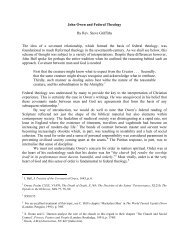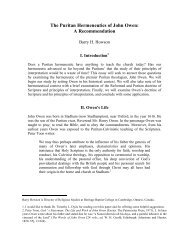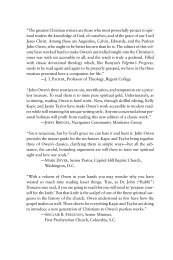M.TH. LONG DISSERTATION (LD6.1) - John Owen
M.TH. LONG DISSERTATION (LD6.1) - John Owen
M.TH. LONG DISSERTATION (LD6.1) - John Owen
Create successful ePaper yourself
Turn your PDF publications into a flip-book with our unique Google optimized e-Paper software.
<strong>John</strong> <strong>Owen</strong>’s Theological Context<br />
large collections in Oxford’s libraries. 42 Therefore, we might expect him to be extremely<br />
well read in contemporary Reformed thought. According to his own comments, Bucer,<br />
Calvin, Vermigli, Musculus, and Beza were the leading Reformed theologians. 43 Clark<br />
and Beeke have also noted Ursinus’s influence (through the Heidelberg Catechism and<br />
his published lectures on the Catechism) in sixteenth and early seventeenth century<br />
England, particularly in Oxford, 44 where <strong>Owen</strong> studied with influential Reformed<br />
tutors. 45<br />
Regarding the doctrine of justification, Alister McGrath states that the English<br />
Puritans generally followed Reformed Orthodox formulations, especially in relation to<br />
election and to the imputation of Christ’s righteousness, and cites <strong>Owen</strong> as typical of<br />
this. 46 Indeed, when writing on justification, it is evident that <strong>Owen</strong> regarded himself as<br />
expounding the central tenets of the Reformed doctrine whilst acknowledging that the<br />
tradition was not monolithic regarding the details. 47<br />
The Reformed formulations of justification 48 were attempts to expound the<br />
teachings of Scripture, but were forged in a polemical context against the Catholic<br />
doctrine, a polemic that hardened following the Council of Trent. Reformed theologians<br />
42 On <strong>Owen</strong>’s life and career, the standard biography is Toon 1971; see also Thomson 1850-55; Ferguson<br />
1987: 1-19; Oliver 2002a; Payne 2004: 1-17.<br />
43 Rehnman 2001: 184, who cites <strong>Owen</strong> 1850-55: IV.229; X.488; XI.487, 489.<br />
44 Clark and Beeke 2004. ‘Ursinus played a significant role in mediating Calvinism to Oxford. His<br />
connection with English Calvinism…lies first of all in the Heidelberg Catechism itself and secondarily in<br />
his lectures on the Heidelberg Catechism…. The Catechism was widely used in England and, in January<br />
1579, Oxford University required that it “should be used for the extirpation of every heresy and the<br />
preparation of the youth in true piety.” It was the only catechism printed by the University.’ (pp. 9f.).<br />
Henry Parry’s 1587 translation of Ursinus’s lectures on the Catechism was the standard textbook in Oxford<br />
in the early seventeenth century (p. 12).<br />
45 Rehnman 2001: 182.<br />
46 McGrath 1998: 302-304.<br />
47 E.g., <strong>Owen</strong> 1850-55: V.60-64. <strong>Owen</strong> acknowledged that the Reformed tradition was not uniform<br />
regarding some of the details of justification, for example, whether or not Christ’s active obedience, as well<br />
as his passive obedience was imputed; nevertheless he regarded the central tenets of the doctrine as settled<br />
and uniform.<br />
48 Cf. McGrath 1998: 219-240; Rohls 1998: 117-30; Lane 2002: 17-43.<br />
21





